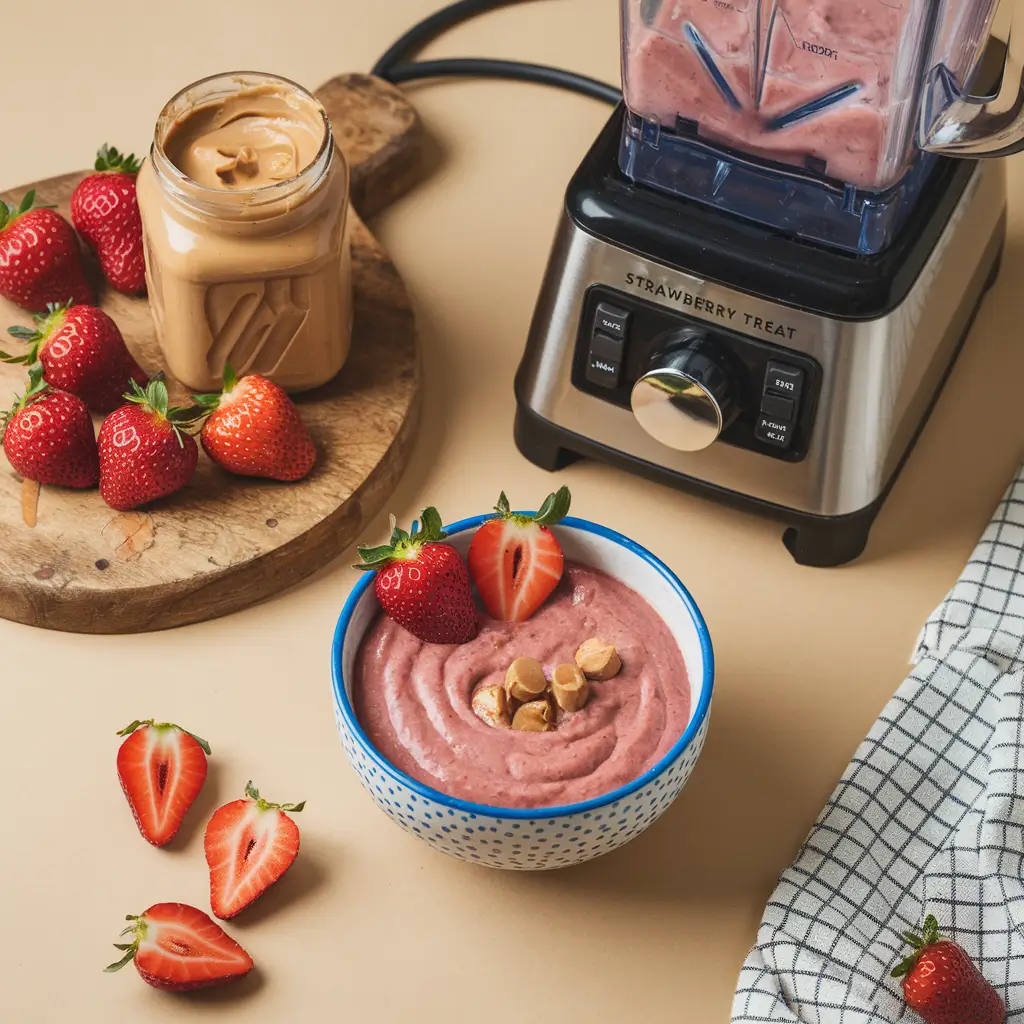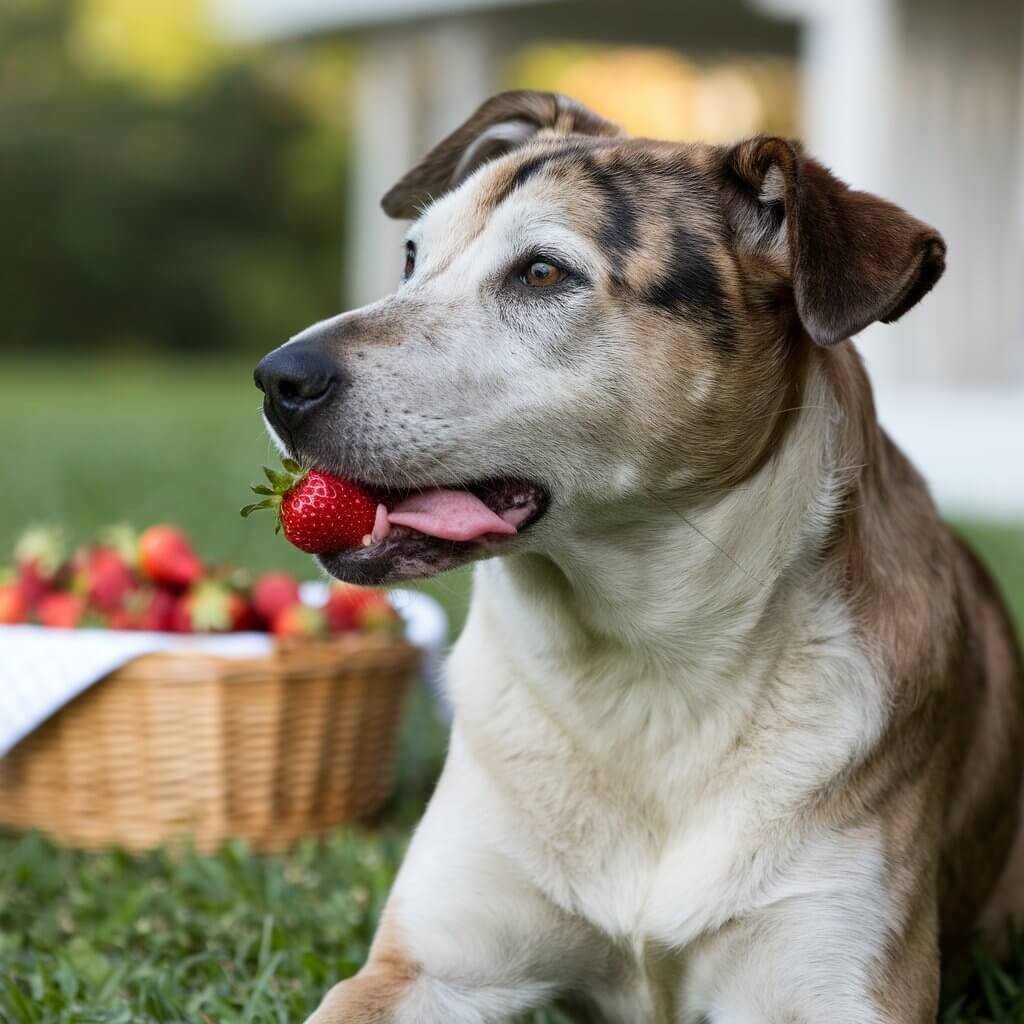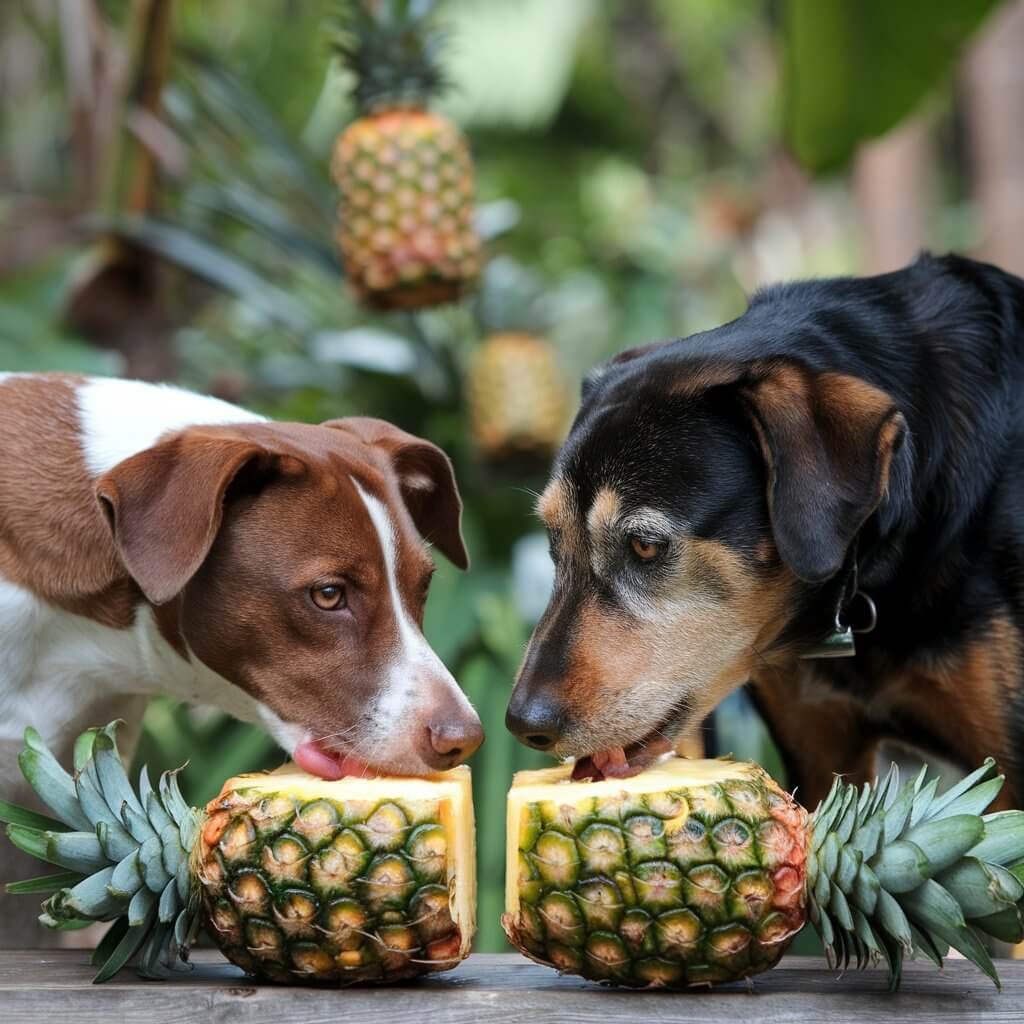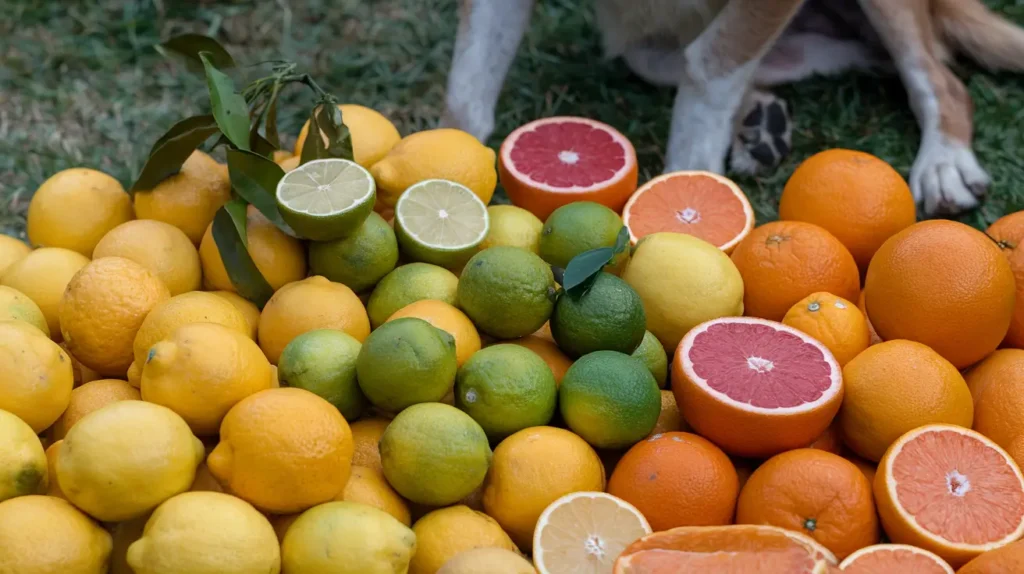Can Dogs Eat Strawberries?
When it comes to feeding our furry companions, safety is always our top concern. With so many fruits and treats available, it’s natural to wonder which foods are safe for dogs. Can Dogs Eat Strawberries? With their bright color, sweetness, and nutritional benefits, strawberries may seem like an appealing option, but it’s important to know whether they are safe for dogs. Here, we’ll explore everything you need to know about feeding strawberries to your dog, from health benefits and precautions to serving suggestions and alternatives.
Table of Contents
Can Dogs Eat Straberries?
Are Strawberries Safe for Dogs?
Yes, strawberries are generally safe for dogs to consume in moderation. These juicy, low-calorie fruits offer a range of nutrients that can benefit your dog’s health when given as an occasional treat. However, as with any new food, it’s essential to introduce strawberries gradually and observe your dog for any adverse reactions.

Nutritional Benefits of Strawberries for Dogs
Strawberries are packed with vitamins, fiber, and antioxidants that can support your dog’s health. Here’s a closer look at the nutritional benefits strawberries can offer to your dog:
How to Safely Feed Strawberries to Your Dog?
If you decide to introduce strawberries to your dog’s diet, here are some guidelines to follow to ensure safety and enjoyment:
1. Wash Thoroughly
Before serving strawberries to your dog, be sure to wash them thoroughly to remove any dirt, pesticides, or chemicals. Organic strawberries are preferred since they are less likely to have pesticide residues.
2. Remove Stems and Leaves
Remove the stems and leaves, as they can be difficult for dogs to digest and may pose a choking hazard, especially for small breeds.
3. Cut into Bite-Sized Pieces
Cut strawberries into small, bite-sized pieces to prevent choking. For smaller dogs, you may want to dice the strawberries further or even mash them for easier consumption.
4. Serve in Moderation
Though strawberries are beneficial, they do contain natural sugars. Serve in moderation, especially if your dog has diabetes or is sensitive to sugar. Generally, one to two strawberries are suitable for small dogs, while larger breeds can have a few more.

Can Dogs Eat Strawberries: Potential Risks and Precautions
While strawberries are safe for most dogs, there are a few precautions to consider:
Sugar Content
Strawberries, like many fruits, contain natural sugars that can be harmful if consumed in large quantities. High sugar intake can lead to weight gain, dental issues, and even diabetes in dogs over time. Always monitor the amount given and avoid feeding strawberries too frequently.
Choking Hazard
As mentioned earlier, the size of strawberry pieces is essential, especially for small dogs. Large chunks can be a choking hazard, so always cut the fruit appropriately.
Pesticides and Chemicals
Non-organic strawberries may have pesticide residues, which can be harmful to dogs. Whenever possible, opt for organic strawberries, or thoroughly rinse non-organic ones to minimize any potential pesticide exposure.
Allergic Reactions
Some dogs may be allergic to strawberries. After introducing them, observe your dog for symptoms of an allergic reaction, such as itching, swelling, vomiting, or diarrhea. If any of these symptoms appear, discontinue use immediately and consult your veterinarian.
Can Dogs Eat Strawberries Raw?
Yes, dogs can eat raw strawberries in moderation. Raw strawberries are actually one of the healthiest forms of this fruit, as they retain their full nutritional value, including vitamin C, fiber, and antioxidants.
These nutrients help to support the immune system, improve digestion, and even support healthy skin and a shiny coat.
However, there are a few important things to remember when feeding raw strawberries to your dog:
- Moderation: Strawberries are naturally sweet, which means they contain sugar. While a small amount is fine, too many strawberries can cause gastrointestinal issues, such as diarrhea or upset stomach
- Choking Hazards: For smaller dogs, or if the strawberry is particularly large, be sure to cut it into smaller, bite-sized pieces to prevent choking
- Avoid Stems and Leaves: The green tops and leaves of strawberries are difficult to digest and may cause stomach discomfort, so always remove them before giving the fruit to your dog.
How Many Strawberries Can Dogs Eat?
The amount of strawberries a dog can safely eat depends on their size, age, and individual health. Here’s a general guide:
Small Dogs: 1–2 strawberries, cut into small pieces
Medium Dogs: 3–4 strawberries, cut into small pieces
Large Dogs: 5–6 strawberries, cut into small pieces
It’s best to treat strawberries as an occasional addition rather than a daily snack. Overconsumption can lead to gastrointestinal upset due to the fiber and sugar content.
Healthy Ways to Serve Strawberries to Your Dog
There are various ways to incorporate strawberries into your dog’s diet. Here are a few dog-friendly serving ideas:
Homemade Strawberry Treat Recipes for Dogs
If you enjoy preparing treats for your furry friend, here are some simple, healthy, and delicious strawberry recipes you can try at home. These recipes incorporate dog-safe ingredients and make for great snacks, especially during warmer months.

1. Strawberry and Banana Dog Popsicles
Ingredients:
- 1 cup of fresh strawberries (washed and stems removed)
- 1 ripe banana.
- 1/2 cup of unsweetened plain yogurt (dog-safe and xylitol-free)
Instructions:
- Blend the strawberries, banana, and yogurt until smooth.
- Pour the mixture into silicone molds or an ice cube tray.
- Freeze for a few hours until solid.
- Serve as a cool treat for your dog on a hot day.
Benefits: These popsicles are hydrating and provide a cooling sensation, perfect for summer. Plus, the yogurt adds a probiotic boost, promoting digestive health.

2. Strawberry Oatmeal Dog Biscuits
Ingredients:
- 1 cup of fresh strawberries (mashed)
- 1 cup of rolled oats
- 1/2 cup of whole wheat flour
- 1 egg
Instructions:
- Preheat your oven to 350°F (175°C).
- In a mixing bowl, combine the mashed strawberries, oats, flour, and egg. Mix well until a dough forms.
- Roll out the dough on a floured surface and use a cookie cutter to cut out shapes.
- Place the biscuits on a baking sheet lined with parchment paper.
- Bake for 20-25 minutes, or until golden brown.
- Let the biscuits cool completely before serving.
Benefits: These crunchy treats are great for your dog’s dental health, and the oats provide fiber for a healthy digestive system.

3. Strawberry and Peanut Butter Dog Smoothie
Ingredients:
- 1 cup of fresh strawberries (washed and sliced)
- 1 tablespoon of natural peanut butter (xylitol-free)
- 1/2 cup of water or dog-safe bone broth
Instructions:
- Blend all ingredients until smooth.
- Pour the smoothie into your dog’s bowl or over their regular food for added flavor.
- You can also freeze the smoothie into small cubes for an additional snack option.
Benefits: This smoothie is full of flavor and provides a quick energy boost, making it a perfect snack after a long walk or play session.

4. Strawberry & Coconut Dog Treats
Ingredients:
- 1 cup of fresh strawberries (mashed)
- 1/2 cup of unsweetened shredded coconut
- 1/4 cup of oat flour (or substitute with rice flour)
- 1 tablespoon of coconut oil
Instructions:
- Preheat your oven to 350°F (175°C).
- Mix the mashed strawberries, shredded coconut, oat flour, and coconut oil in a bowl until combined.
- Form small balls or press into desired shapes.
- Place on a baking sheet lined with parchment paper and bake for 15-20 minutes, or until slightly golden.
- Let them cool completely before serving.
Benefits: Coconut is good for a dog’s coat and skin, while strawberries add vitamins and antioxidants. These treats are also grain-free, making them ideal for dogs with sensitivities.

5. Frozen Strawberry & Watermelon Bites
Ingredients:
- 1/2 cup of fresh strawberries (washed and chopped)
- 1/2 cup of seedless watermelon (cubed)
- Silicone molds or an ice cube tray
Instructions:
- Blend the strawberries and watermelon until smooth.
- Pour the mixture into silicone molds or an ice cube tray.
- Freeze for several hours or overnight.
- Serve as a refreshing snack on hot days.
Benefits: Both strawberries and watermelon are hydrating fruits that help keep your dog cool and refreshed. Watermelon is low in calories and packed with vitamins A and C.

6. Strawberry & Carrot Pupcakes
Ingredients:
- 1 cup of finely grated carrots
- 1/2 cup of mashed strawberries
- 1/2 cup of whole wheat flour
- 1 egg
- 1 tablespoon of honey (optional, for added sweetness)
Instructions:
- Preheat your oven to 350°F (175°C) and line a mini muffin tin with paper liners.
- In a bowl, mix the grated carrots, mashed strawberries, flour, egg, and honey until combined.
- Spoon the batter into the muffin tin, filling each cup about 3/4 full.
- Bake for 15-20 minutes, or until a toothpick comes out clean.
- Let the pupcakes cool completely before serving.
Benefits: Carrots are rich in beta-carotene, which is great for vision and overall health. The combination with strawberries provides a nutrient-dense and delicious treat.
Signs Your Dog Enjoys Strawberries
Dogs have different reactions to new foods, and it’s important to watch for signs that your dog genuinely enjoys strawberries. Here are some positive signs to look for:
- xWagging Tail: If your dog happily wags its tail while eating strawberries, it’s a good indicator that they’re enjoying the treat.
- Eager Behavior: Dogs that become excited or look forward to being fed strawberries likely find them delicious.
- No Adverse Reactions: If your dog shows no signs of digestive upset or allergic reactions, you can consider the experience a success.
On the other hand, if your dog seems uninterested or hesitant, it’s best to try a different type of fruit or snack that they might prefer.
What to Do If Your Dog Overeats Strawberries
Accidents happen, and if your dog manages to eat a large number of strawberries, it’s essential to be prepared. Here’s what you should do:
- Monitor Your Dog: Watch for symptoms such as vomiting, diarrhea, bloating, or lethargy. Mild digestive upset may pass, but keep a close eye on your dog’s behavior.
- Provide Plenty of Water: Ensure your dog stays hydrated, as this can help with digestion and prevent dehydration.
Contact Your Veterinarian: If symptoms persist or worsen, consult your veterinarian for guidance. Be ready to share how much your dog ate and any symptoms they are experiencing.
The Importance of Moderation and Balance
While fruits like strawberries can be a fun and healthy snack for dogs, it’s crucial to maintain a well-rounded diet that meets all of your dog’s nutritional needs. Dogs thrive on a diet rich in high-quality proteins, healthy fats, and essential vitamins and minerals. Fruits and vegetables should make up only a small portion of their diet, primarily serving as treats or supplements.
Overfeeding fruits can lead to an imbalance in your dog’s diet, so always stick to recommended serving sizes and watch your dog’s overall calorie intake. For dogs with specific health conditions, like diabetes or gastrointestinal issues, working closely with your veterinarian is essential to ensure your dog’s diet remains appropriate and healthy.

When to Avoid Feeding Strawberries to Your Dog
In certain cases, it may be best to avoid strawberries altogether. If your dog has any of the following conditions, consult your veterinarian before offering strawberries:
What American Medical Universities and Pets experts say about it!
Yes, dogs can eat strawberries, but it is important to follow certain guidelines to ensure they are safely enjoyed. Strawberries are packed with nutrients like vitamin C, fiber, and antioxidants, which can offer benefits such as boosting the immune system, aiding digestion, and supporting a healthy coat.
However, there are several things to keep in mind when feeding strawberries to dogs:
Where to Get Fresh Strawberries for Your Dog
- Local Farmers’ Markets: Farmers’ markets often sell freshly picked, organic strawberries, which are free from pesticides and chemicals, making them a healthier choice for your pet.
- Grocery Stores: Many supermarkets carry fresh strawberries year-round. Look for strawberries that are firm, bright red, and free of mold or damage. Organic options are preferred if available.
- Pick-Your-Own Farms: During strawberry season, visit a local farm for a fun experience picking fresh strawberries. This is a great way to get the freshest fruit and ensure it is chemical-free.
- Community Supported Agriculture (CSA) Boxes: Subscribing to a local CSA can provide you with fresh, seasonal strawberries and other fruits delivered regularly.
Alternatives to Strawberries for Dogs: Understanding Dog-Safe Fruits Beyond Strawberries
While strawberries are an excellent fruit for dogs, you may also want to explore other dog-safe options to add variety to your dog’s diet. Here’s a quick guide to additional fruits that are safe and beneficial for dogs:
Dogs Eat Strawberries?
Which Dogs Can't Eat Strawberries
While strawberries are generally safe for most dogs, there are certain dogs that may need to avoid this fruit or consume it with extra caution:
3. Dogs with Allergies
Although rare, some dogs may be allergic to strawberries. Signs of an allergic reaction include itching, swelling, hives, or difficulty breathing. If your dog shows these symptoms, stop feeding strawberries and consult your vet.
When to Contact Your Veterinarian?
If you’re ever unsure about a specific food item or if your dog has any health issues that could be affected by dietary changes, it’s always wise to consult your veterinarian. Your vet can provide tailored advice based on your dog’s unique health profile, age, weight, and activity level.
Signs That Warrant a Vet Visit After Eating Strawberries
- Persistent vomiting or diarrhea
- Signs of an allergic reaction (e.g., swelling, hives, difficulty breathing)
- Lethargy or significant changes in behavior
- Any concerns related to pre-existing health conditions
Remember, being proactive about your dog’s health can prevent potential issues and ensure your furry friend stays happy and healthy.
Can Dogs Eat Strawberries?
Common Questions that Dog's Owners Mostly Askes
Can Puppies Eat Strawberries?
Yes, but only in very small amounts. Puppies have more sensitive digestive systems, so be extra cautious when introducing strawberries.
Can Dogs Eat Strawberry Leaves and Stems?
It’s best to avoid feeding strawberry leaves or stems to your dog. The leaves and stems are not toxic but can be difficult for dogs to digest and may cause stomach upset. Always remove them before serving strawberries to your dog.
Are Canned or Processed Strawberries Safe?
No, it is not advisable to give your dog canned or processed strawberries. These products often contain added sugars, syrups, or preservatives that can be harmful to your dog. Stick to fresh or plain frozen strawberries to keep things natural and safe.
Can Dogs Eat Strawberry Ice Cream?
No, it is generally not recommended for dogs to eat strawberry ice cream. While small amounts may not be immediately dangerous, ice cream poses several risks:
Lactose Intolerance: Many dogs are lactose intolerant, and consuming ice cream can lead to symptoms like diarrhea, gas, or stomach discomfort.
Sugar Content: Ice cream is high in sugar, which can contribute to obesity, dental issues, and even diabetes if given regularly.
Toxic Ingredients: Some ice creams contain artificial sweeteners like xylitol, which is highly toxic to dogs. Always check labels and err on the side of caution.
Can Dogs Eat Strawberry Yogurt?
Dogs can eat plain strawberry yogurt in small amounts, but there are important considerations:
- Check for Added Sugars: Yogurt with added sugars, artificial sweeteners (especially xylitol), or artificial flavors should be avoided.
- Digestive Benefits: Plain, unsweetened yogurt that contains live cultures (probiotics) can support gut health. Strawberry-flavored yogurt should be as natural as possible and free from additives.
- Moderation: Offer yogurt sparingly, as dairy can be difficult for some dogs to digest.
Can Dogs Eat Strawberries And Blueberries
Yes, dogs can safely have both strawberries and blueberries in moderation. Both fruits are rich in antioxidants, vitamins, and fiber, making them healthy snack options. Blueberries, in particular, are low in calories and beneficial for brain and heart health, while strawberries offer immune-boosting vitamin C and fiber.
Serving Tips:
- Wash fruits thoroughly to remove any pesticides or contaminants.
- Offer in small, bite-sized pieces to prevent choking.
- Use these fruits as occasional treats to maintain a balanced diet.
Conclusion and Final Thoughts Can Dogs Eat Strawberries?
Strawberries are a fantastic treat that can provide numerous health benefits when given appropriately. They are packed with vitamins, antioxidants, and fiber, making them a healthy choice for your dog. By introducing strawberries safely and creatively, you can add a burst of nutrition to your dog’s diet while keeping snack time fun.
Remember that moderation is key, and always observe your dog’s reactions when trying any new food. With the right balance and care, strawberries can become one of your dog’s favorite healthy treats!
FAQs: Can Dogs Eat Strawberries?
No, strawberry jam often contains sugar and preservatives that aren’t healthy for dogs.
Dried strawberries are more concentrated in sugar, so they’re best avoided or given in very small amounts.
Yes, strawberries have natural enzymes that may help freshen your dog’s breath.
Can strawberries help with a dog’s weight management?
When given in moderation, strawberries can be a low-calorie treat that won’t add unnecessary weight.
Start with small pieces and monitor for any adverse reactions. If they enjoy it and show no negative effects, you can include strawberries as an occasional treat.
Latest Posts
Can Dogs Eat Doritos? 4 Powerful Points That Shows Doritos Are Unsafe for Dogs
As pet owners, we often find ourselves tempted to share our snacks with our furry companions. One common question that arises is, “Can dogs eat Doritos?” No, dogs should not eat Doritos. While a small amount is unlikely to cause immediate harm, the ingredients in Doritos, such as high salt content, artificial flavors, and spices,…
Can Dogs Eat Macadamia Nuts? 7 Solid Symptoms of Macadamia Nut Poisoning in Dogs
When it comes to feeding our dogs, we often look to share some of our favorite snacks with them. However, not everything that is safe for humans is equally harmless to dogs. The common question is that Can Dogs Eat Macadamia Nuts? the short answer is no, dogs should not eat macadamia nuts. These nuts…
Can Dogs Eat Sunflower Seeds? 6 Solid Reasons Dogs Eat Sunflower Kernels
When it comes to our furry companions, it’s natural to question the safety and benefits of the foods they consume. Sunflower seeds are a popular snack among humans, but Can dogs eat Sunflower seeds? Are Sunflower seed safe for dogs? Yes, dogs can eat sunflower seeds and sunflower seeds are safe in moderation, provided certain…
Can Puppies Eat Bread? 3 Surprising Benefits Explained
Can Puppies Eat Bread? This is a question many pet owners ask when considering sharing their food with their furry friends. While bread is a common food in human diets, it’s essential to know whether it’s safe and beneficial for puppies. Understanding the potential risks and benefits will help you make the best decision for…
Can Dogs Eat Bread? 3 Shocking Risks That Show Bread Can Be Bad for Dogs
Can dogs eat bread? Is bread bad for dogs? These are common questions among pet owners. Bread is a staple in many households, and while dogs can eat bread, it should only be given in moderation and under certain conditions. Plain white or whole wheat bread is generally safe for dogs to consume, but it…
What Citrus Is Toxic to Dogs? Top 4 Types That Are Toxic
Dogs are curious creatures, often eager to explore their surroundings, including the food we eat. While many fruits are safe for dogs in moderation, the question arises: What citrus is toxic to dogs? The answer lies in citrus fruits such as lemons, limes, and grapefruits, which contain compounds that can be harmful to your canine…



















